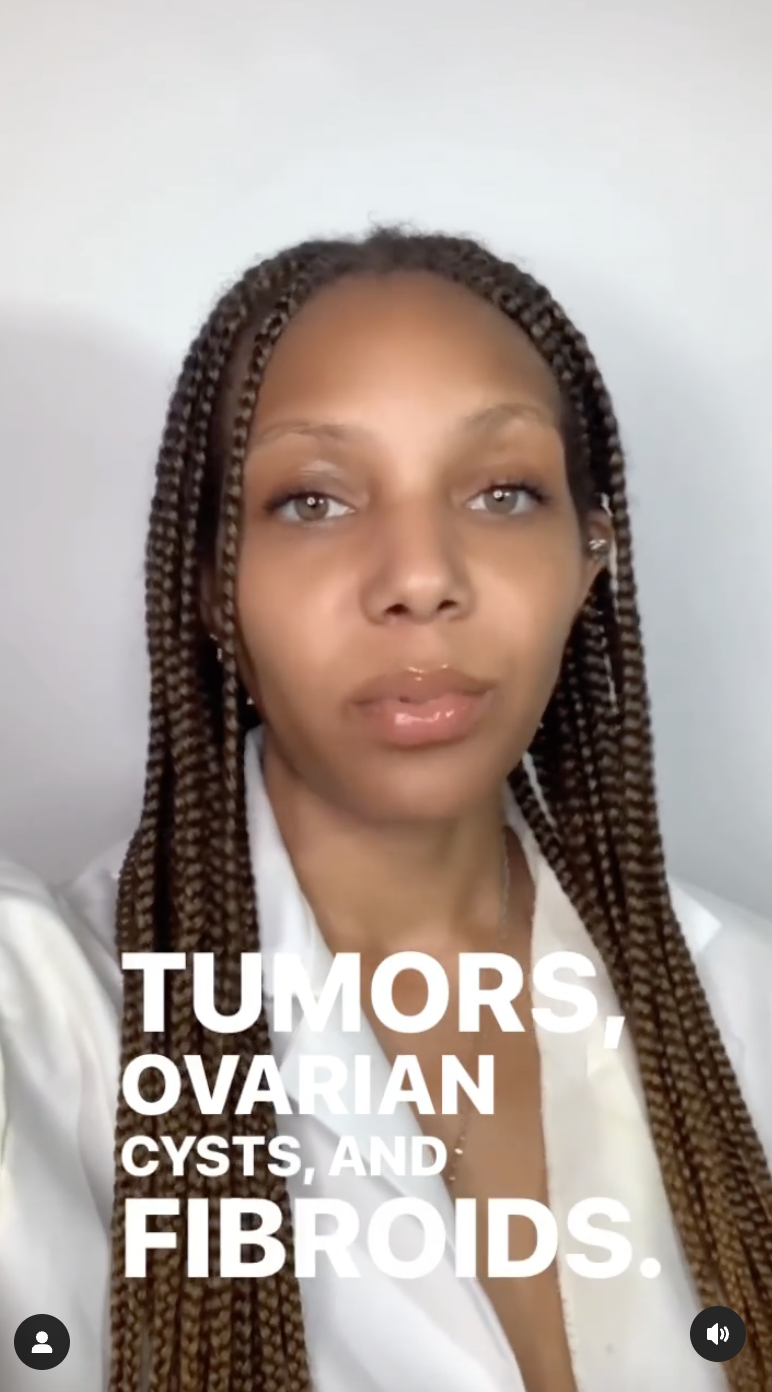STORY UPDATED: check for updates below.

Do tampons pull "moisture out of the vagina" to cause reproductive disorders such as tumors, ovarian cysts and fibroids? No, that's not true: Medical experts told Lead Stories there is no evidence that pulling "moisture out of the vagina" would result in reproductive disorders like tumors, ovarian cysts or fibroids as those are genetic and cell-driven processes unrelated to tampons or vaginal moisture.
There is some anecdotal evidence that tampons may temporarily increase vaginal dryness during menstruation, but this is often the result of an inappropriate absorbency level being used. There are growing concerns over the perceived risk of certain cancer-associated chemicals found in tampons. However, regulations established by the U.S. government require tampons not to contain dangerous chemicals at levels above safe thresholds, the Food and Drug Administration (FDA) told Lead Stories.
The claim originated in a video shared on Instagram on July 20, 2022, that featured Dajah Spence, who runs several businesses including a health spa called The Woman's Villa in Las Vegas. A text overlay on the video read, "KEVIN GATES SPEAKS ON VAGINAL STEAMING AND TAMPONS ‼️ ‼️ ‼️" while an accompanying caption read:
Thank you @kevingates for spreading wisdom 🙏🏼🙏🏼 I can't stress enough how important it is to get a vaginal hydrotherapy session to clean the womb.
Our ancestors didn't wear pads and tampons and not every woman in the world menstruates. Most women just think all women do.
I know what you're going to say, what are we supposed to use if we are bleeding . Well actually we are supposed to only bleed 2-5ml of blood during our menstrual cycles. It's not normal to bleed any more than that. Vaginal steaming will actually reduce the amount of blood loss and well and the length of your menses and the PMS symptoms associated with it.
Book your vaginal wall cleaning today @thewomansvilla ✨ We are located 5 minutes from the Las Vegas Strip at 1771 E. Flamingo Rd. Suite 110B . Link to book in bio
In the video, Spence said the following while onscreen:
See, tampons actually pulls [sic] the moisture out of the vagina, which causes cracked skin and reproductive disorders such as tumors, ovarian cysts and fibroids.
Below is how the post appeared at the time of writing:
(Source: Instagram screenshot taken Mon April 17 11:44:19 UTC 2023)
The original video refers to a July 14, 2022, episode (archived here) of the talk show "Caresha Please" in which American rapper Kevin Gates made several unscientific claims. Neither Gates nor Spence presented scientific evidence to back their claims. Spence uses the video for advertising what appears to be a service at her spa known as vaginal or "yoni" steaming, a practice that is unsupported by evidence.
The claims in the video are "absolutely not" true, Nancy Reame, a certified menopause practitioner and professor emerita of disease prevention and health promotion in the faculty of nursing at Columbia University, told Lead Stories in an email received April 19, 2023.
"I know of no such data that links tampon use as an indirect cause of cysts, fibroids, or cancer, especially due to reducing vaginal moisture," Reame said. "It's important to emphasize that the vagina [and] cervix contain fluid-producing glands and mucous-producing cells, which maintain moisture. Any 'hygiene' products [or] devices meant to reduce normal body odors reduce this natural moisture."
Dr. Mitchell Creinin, a board-certified specialist in obstetrics and gynecology at the University of California, Davis, also confirmed to Lead Stories, in an email received on April 18, 2023, that this claim is not proven.
"From a physiologic standpoint, there is no way that any such action, if true, would cause tumors, fibroids, or ovarian cysts," Creinin explained. "For example, fibroids are basically muscle cells cloning themselves to be bigger than the other muscle cells. Moisture is unrelated to this genetically driven issue."
Ovarian cysts, or fluid-filled sacs, form for a number of reasons most commonly due to the hormonal cycle, such as when a follicle doesn't release an egg, or underlying conditions like endometriosis, according to The Cleveland Clinic. Meanwhile, tumors occur due to abnormal cell growth, according to the National Cancer Institute (NCI). Neither condition has been linked to the use of tampons.
In an email to Lead Stories, received on April 21, 2023, NCI, which disseminates evidence-based information about cancer to the public, confirmed that the agency did not have a record of information to support the claim that tampons cause tumors.
Tampons are designed to absorb menstrual fluid and may sometimes cause temporary dryness. This, however, is often resolved by switching to a tampon with an absorbency level appropriate for a person's flow.
Single-use tampons are regulated by the FDA as medical devices and are typically made of cotton, rayon or a blend of the two. As part of the agency's review, manufacturers must submit safety data. In an email to Lead Stories received on April 18, 2023, the FDA confirmed that it "monitors reports of adverse events and other problems with medical devices, including menstrual products, and alerts health professionals and the public when needed to ensure proper use of devices and the health and safety of patients."
Lead Stories searched the medical device reports in the FDA MAUDE database (which is inherently limited in its ability to quantify and standardize adverse events) to determine if there had been any connections between tampon use and fibroids, tumors or ovarian cysts. We searched over 120 available reports and records containing complaints against tampons for dates between January 1, 2023, and March 31, 2023. We found no event that linked tampon use to any of the conditions listed in the video.
However, the use of tampons can cause toxic shock syndrome, a rare but sometimes fatal condition that can be prevented by removing a tampon before eight hours of use.
There is also some perceived risk expressed by groups like the Campaign for Safe Cosmetics that certain products used in tampons may contain traces of harmful chemicals like dioxin from bleach, pesticide residue or fragrance ingredients. However, this field is understudied and there is no definitive evidence that suggests exposure to these chemicals causes cancer. In fact, a 2002 study found that there is thousands of times less exposure to dioxin in tampons than in a person's exposure to food.
Spence also claimed that menstruating people are "supposed to only bleed 2-5ml of blood" during menstrual cycles. That is also not true. A 2019 study found that the volume of menstrual fluid -- which contains blood, vaginal fluid and the cells and fluid of the uterine endometrial lining -- can average between 15 and 271 milliliters per cycle. The average amount of blood contained in menstrual fluid is usually around 60 milliliters.
Lead Stories has also reported that heavy flow is not related to toxicity, that Germany's tampon tax rate is not 19 percent, and that tampon manufacturer Kotex did not introduce confetti-filled tampons.
Updates:
-
2023-04-21T20:25:18Z 2023-04-21T20:25:18Z Adds response from National Cancer Institute
















